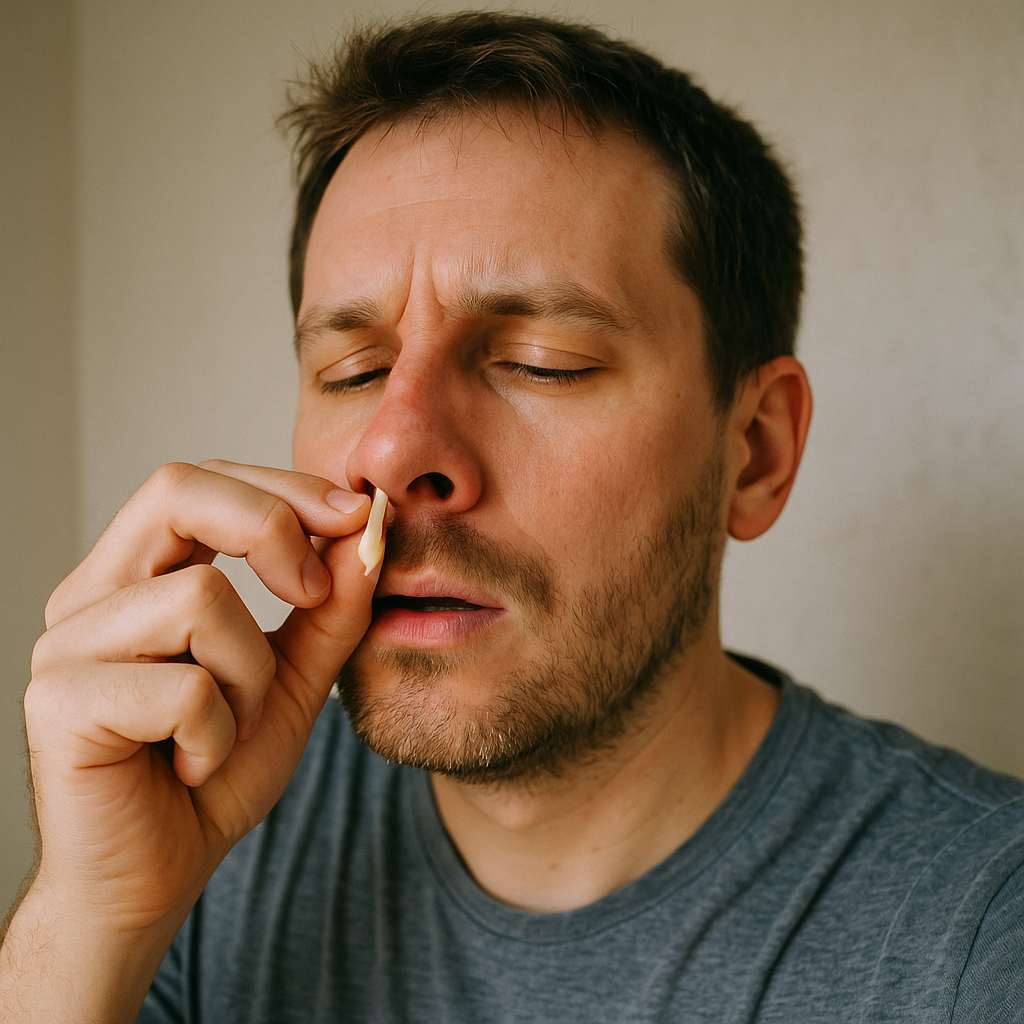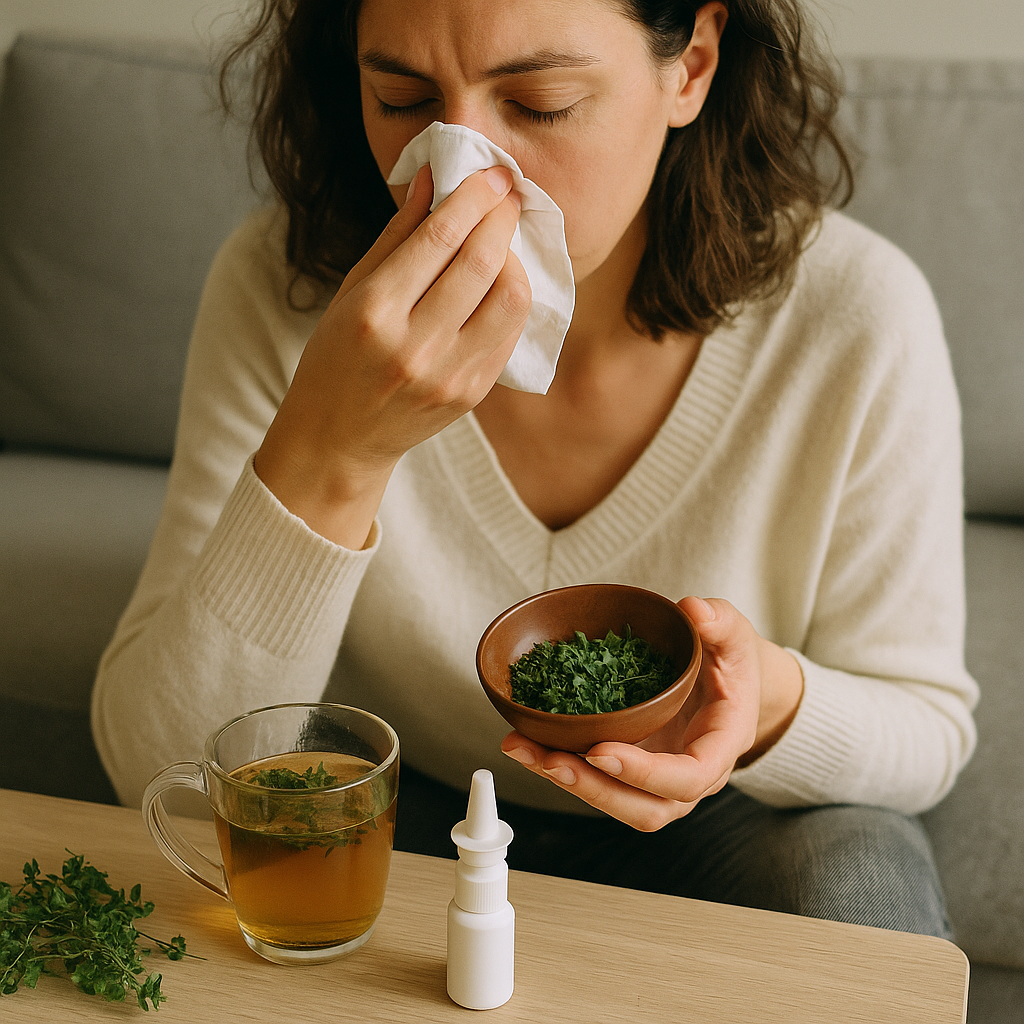Ask Ayurvedic doctor a question and get a consultation online on the problem of your concern in a free or paid mode. More than 2,000 experienced doctors work and wait for your questions on our site and help users to solve their health problems every day.
How to Remove Nasal Polyps Yourself: Ayurvedic Methods and Home Remedies

If you’ve been wondering how to remove nasal polyps yourself without surgery, you’re not alone. Many people are turning away from conventional medications and looking for holistic, natural ways to deal with this stubborn issue. Nasal polyps—those soft, noncancerous growths inside the nasal passages—can make everyday life feel frustrating. From difficulty breathing to chronic sinus infections, they can really mess with your routine.
But here’s the good news: you can take steps at home to manage and even shrink nasal polyps naturally. Using simple Ayurvedic principles and proven home remedies, there are ways to support your body’s healing process. In this article, we’ll explore how to get rid of nasal polyps using natural remedies and Ayurvedic practices that have helped people for centuries. If you’re looking for nasal polyps treatment at home that actually feels doable (and doesn’t sound like a chemistry experiment), keep reading.
Let’s break it all down so you can start feeling like yourself again—without relying entirely on steroids or surgery.
What Are Nasal Polyps and Why They Develop
Nasal polyps are small, tear-drop shaped growths that form in the lining of your nasal passages or sinuses. They're usually the result of long-term inflammation, and are often linked to conditions like asthma, allergies, recurring infections, or sensitivities to certain chemicals. Basically, when your nose and sinuses are irritated over and over again, your body sometimes reacts by forming these annoying little growths.
What causes this ongoing inflammation? That’s a bit of a tricky question. For some people, it’s an overactive immune response. For others, it’s constant exposure to allergens or even poor gut health (yup, your sinuses and your gut might be more connected than you think).
And although these polyps are benign (non-cancerous), they can block airflow, mess with your sense of smell, and lead to that awful clogged-head feeling. That's where nasal polyps removal at home becomes a big focus for many sufferers.

Don't wait or self medicate. Start chat with Doctor NOW
At-Home Remedies and Natural Treatments for Nasal Polyps
Treating nasal polyps naturally at home isn’t just possible—it can also be super effective if you’re consistent. Here are a few tried-and-true options, many of which are rooted in Ayurvedic practice, to support nasal polyps treatment without harsh chemicals.
Herbal Steam, Oils, and Nasya Therapy
Let’s start with the classics: steam. Inhaling herbal steam can help shrink nasal polyps by soothing inflammation and opening up nasal passages. Add a few drops of eucalyptus oil or tea tree oil to boiling water, cover your head with a towel, and breathe in the steam deeply for 10 minutes. Not too hot though—you don’t wanna burn your nose, obviously.
Then there’s Nasya therapy—an Ayurvedic practice where medicated oils (like Anu Taila or Shadbindu Taila) are gently dropped into the nostrils. This method helps to lubricate the nasal passage, reduce swelling, and encourage nasal polyps removal naturally. It can feel a little strange the first time, but once you get used to it, it’s honestly kind of soothing.
One reader emailed to say they started using nasya oil each morning and noticed they could breathe easier within just a couple weeks. Not a miracle cure—but definitely something.
Dietary Adjustments and Lifestyle to Reduce Recurrence
Now, let’s talk food—because what you eat can actually influence how your body responds to inflammation. If you're serious about figuring out how to get rid of nasal polyps naturally, tweaking your diet is a smart move.
Start by cutting back on inflammatory foods. Think sugar, processed junk, dairy (for some people), and anything that tends to trigger mucus production. If your sinuses are already acting like a clogged drain, you don’t wanna pour syrup down there, metaphorically speaking. Try incorporating more anti-inflammatory foods like turmeric, ginger, leafy greens, and omega-3 rich foods like flaxseed or walnuts.
It’s not just about what you take out—it’s also what you add in. Warm, cooked meals that are easy to digest can support better immunity and sinus health. Cold smoothies might seem healthy, but they can aggravate symptoms in some folks, especially if you already feel “cold and damp” internally. Ayurveda teaches us to favor warmth, balance, and grounding when inflammation is involved.
Hydration is big too. Herbal teas like tulsi (holy basil), licorice root, and nettle can help calm down irritation and support detox. A nasal polyps natural cure doesn’t happen overnight, but small daily habits do add up.
Detox Practices and Anti-Inflammatory Herbs
Another key piece of nasal polyps treatment at home is detoxification. No, not those harsh juice cleanses that leave you dizzy and hangry—but gentle, consistent detox practices that help your body clear out the junk and restore balance.
Try tongue scraping in the morning, drinking warm lemon water, and moving your body daily—even if it's just a 15-minute walk. Dry brushing and epsom salt baths can also support lymphatic drainage, which might sound fancy but is really just about helping your body do what it’s designed to do: heal.
And let’s not forget about herbs. Ayurvedic herbs like Trikatu (a blend of black pepper, long pepper, and ginger) and Guduchi are believed to reduce inflammation and support immune function. Turmeric with black pepper? Classic anti-inflammatory duo. These can be taken in capsule form or added to meals (or even stirred into golden milk at bedtime).
Some folks swear by using a neti pot with saline and a pinch of turmeric—but full disclosure: this isn't for everyone. Always check with a practitioner before putting anything weird up your nose. You don't wanna turn your healing journey into a DIY horror story.
If you’re looking for a natural remedy for nasal polyps that works gently over time, these herbal and detox tools can be powerful additions. The key word? Consistency.

Ayurvedic Long-Term Care and Prevention Strategies
Managing symptoms is great, but let’s talk about the long game. Ayurvedic philosophy isn’t just about treating what's in front of you—it's about why it got there in the first place. Understanding the root causes behind nasal polyps can help you prevent them from coming back.
Building Nasal Immunity and Reducing Mucosal Swelling
In Ayurveda, nasal health is deeply connected to a concept called "Prana"—the vital life force we take in through breath. When this flow is blocked, the system gets sluggish. The idea behind treatment for nasal polyps, then, isn’t just reducing growths—it’s restoring balance to the whole respiratory channel.
You can support this by working on your ojas, or core vitality. This means sleeping well, managing stress (yup, stress plays a role), and keeping your gut happy. Probiotics, triphala, and ghee can all support better digestion and immune function.
Daily Routine (Dinacharya) and Breathing Practices for Support
To really support long-term nasal polyps treatment, you’ll want to align your daily habits—or dinacharya, as it's called in Ayurveda—with healing rhythms. It doesn’t have to be a massive lifestyle overhaul. Even a few tweaks to your morning and evening routines can help your body manage inflammation and reduce nasal congestion.
Start your day with gentle oil pulling, tongue scraping, and a warm glass of lemon water. These small practices help remove toxins that build up overnight and prep your body for a clearer, calmer day. Following that with five minutes of pranayama—especially Anulom Vilom or Nadi Shodhana (alternate nostril breathing)—can enhance nasal airflow, reduce stress, and gradually help with nasal polyps removal.
Try to go to bed by 10 p.m. (yep, earlier than most of us like) and avoid screen time at least 30 minutes before. It sounds like small stuff, but these patterns add up. Your body thrives on rhythm. And a stressed, irregular lifestyle? That’s a ticket to chronic inflammation.
By consistently showing up for these daily practices—even when you're tired, even when nothing seems to be “working”—you’re giving your body the message: hey, we’re healing here.
Conclusion
So, how to remove nasal polyps yourself? It’s not about finding some magical overnight fix. It’s about layering small, effective changes—herbal steams, nasya oil, detox habits, anti-inflammatory foods, and conscious breathwork—into your life, and sticking with them.
Nasal polyps are stubborn, but not invincible. With Ayurvedic methods and thoughtful at-home remedies, you can shrink them naturally, ease your symptoms, and even prevent them from returning. Sure, there may still be days when you feel stuffy or off. That’s life. Healing isn’t linear. But with consistency and a little self-kindness, the changes are real.
If you’ve been searching for a nasal polyps treatment that doesn’t rely on drugs or surgery, this holistic approach is worth exploring. You don’t need a white coat or a pharmacy to start healing—just a bit of patience, some warm oil, and maybe a few herbs from your kitchen.
Your body knows how to heal. Give it the tools and time it needs.
If you found this helpful, share it with a friend or family member who’s also struggling with sinus issues. And if you’re curious to go deeper, consider consulting an Ayurvedic practitioner who can tailor a plan just for you. Healing isn’t one-size-fits-all—but it is possible.
FAQs
What is the fastest way to shrink nasal polyps?
The fastest way to shrink nasal polyps naturally is usually a combination of daily steam inhalation (with eucalyptus or tea tree oil), nasya oil application, and reducing inflammatory foods in your diet. While not instant, consistent use of these methods can yield visible improvements within a few weeks.
What does a nasal polyp look like when it comes out?
This can sound a little gross, but people do ask! When a nasal polyp loosens and comes out, it might look like a small, pale or grayish jelly-like blob. Some describe it as a grape-sized lump or soft tissue. If this happens suddenly or you’re unsure what it is, it’s best to consult a healthcare professional just in case.
How often should home treatments be done to see results?
For best results, steam therapy can be done daily (especially in the evening), nasya oil 4–6 times a week, and dietary/lifestyle changes maintained consistently. You might start seeing reduced swelling and easier breathing in 2–3 weeks, though every body’s different. Stick with it for at least a month to assess how it’s working for you.

